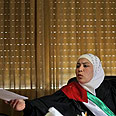
2 Palestinian women become judges in Islamic court
West Bank women make history, becoming first female judges in Palestinian Islamic court that deals with family affairs. Top judge responsible for appointment says he hopes more women apply for job
The Islamic courts were among the last male-only bastions in Palestinian society, where women have been presidential candidates, police officers and even suicide bombers.
Now two stern-looking young women in Muslim headscarves and long black robes have smashed through the thick glass ceiling.
Khuloud Faqih, 34, and Asmahan Wuheidi, 31, made history in February when they became the first female Islamic judges in the Palestinian territories.
Across the Arab world, only Sudan has had women judges in Islamic courts, West Bank-based academic experts on Islamic affairs said. Lebanon, Syria and Jordan, all relatively progressive states in the region on women's rights, do not.
"I compare us to other Arab Muslim women, and I think we've done well," said Faqih, wearing a sash in the colors of the Palestinian flag across her robe. "I think I've opened a door for myself and other women."
She spoke between meetings with petitioners in her modest courtroom - an office with a few couches, a desk and a coffee table with plastic flowers.

Judge Khuloud Faqih at work (Photo: AP)
Muslim courts in the Palestinian Authority rule over family affairs like marriage, divorce, inheritance and custody, relying on Islamic jurisprudence rather than secular rules.
The petitioners did not seem shocked to see a woman in the judge's seat - in this case, an office chair. But they appeared to argue often and loudly with Faqih, in stark contrast to the quiet in a neighboring room where a male judge heard cases from respectful petitioners.
Palestinian feminists have praised the female judges but say the move will not make a dramatic change, because the judges still rely on Islamic laws that ultimately favor men.
"As long as the law is the law, which is difficult to women, I don't think it will change much," said Dima Nashashibi of the Palestinian Women's Center for Legal Aid and Counseling.
The top judge responsible for the appointment, Sheik Taysir Tamimi, said Faqih approached him in August asking if she could apply for a position.
"I said, 'I beg you to apply,'" Tamimi said, hoping it would help women obtain better rulings. Tamimi debated the issue with his reluctant colleagues, then issued a letter confirming that women could become Muslim judges.
The decision only affects the West Bank, ruled by the Western-backed Palestinian Authority. In the Gaza Strip, the ruling militant group Hamas has not made similar appointments.
Tamimi said he hoped more women apply, but said the openness to change among critics depends on how the two new judges perform.
"Any new experience will have supporters and detractors. But if you want to please everybody, we'll never move forward as a society," he said.










